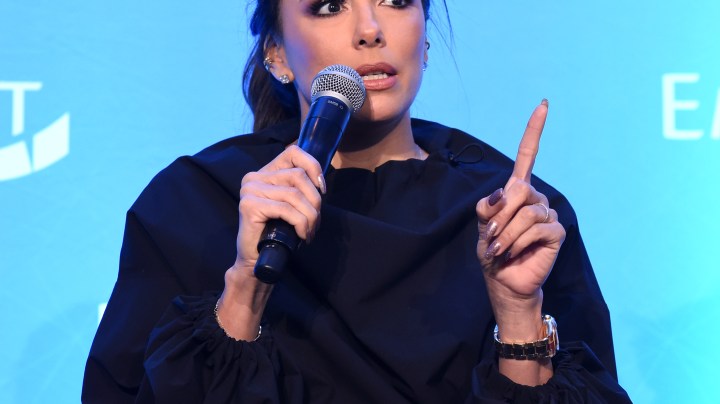All-Women Panel Discusses the Erasure of Latinos in Hollywood During Academy-Sponsored Series

Eva Longoria speaks onstage during EMILY's List Brunch and Panel Discussion "Defining Women" at Four Seasons Hotel Los Angeles at Beverly Hills on February 04, 2020 in Los Angeles, California. Photo by Presley Ann/Getty Images for EMILY's List
On Tuesday, the Academy of Motion Picture Arts and Sciences announced new inclusion standards that studios would have to meet if they wanted their films to be eligible for an Oscar for Best Picture starting in 2024. Two days later, the Academy invited a panel of Latinas working in Hollywood to talk about the importance of inclusion and the increasing invisibility of Latinos in the industry.
The series, “Academy Dialogues: It Starts with Us,” continued Thursday afternoon with a conversation on “The Erasure of Latinos in Hollywood,” which is now available to watch in its entirety on YouTube. The panel was moderated by the Academy’s Lorenza Muñoz, executive vice president of member relations and awards.
Panelists included Victoria Alonso, executive vice president of production for Marvel Studios; Carmen Cuba, casting director (The Martian); Nadia Hallgren, director (Becoming); Eva Longoria, actress, producer, director and activist; and Ivette Rodriguez, founder and president of American Entertainment Marketing and co-founder of LA Collab.
According to a 2019 study from the Annenberg Inclusion Initiative at the University of Southern California, only 3% of actors who played a lead or co-lead role in one of the 100 top-grossing movies each year from 2007-2018 were Latines. The statistics for directors, producers and casting executives were just as abysmal.

The 70-minute discussion began with Longoria’s start as an actress in Hollywood—a space that didn’t think she was Latina enough because she didn’t speak Spanish or have an accent “like Rosie Perez.”
“What it made me realize in the industry was… that Hollywood thought we were a monolith,” Longoria said. “There was a big learning curve for our industry. I don’t know if we’ve taken enough steps in the right direction, but at least we’re facing the right direction.”
During the discussion, Alonso told a story about a pitch meeting at Marvel that she and some other executives were running late for. When she went into the room to apologize to the director and to see if anyone had asked him if he would like anything to drink, he snapped his coffee order at her thinking that she was an assistant. A few minutes later when the meeting began, he realized the person he had treated so rudely was a Marvel executive.

“I thought, ‘I won’t forget this moment, and I’m sure he won’t forget this moment,’” Alonso said. “Even in that moment in time where we had made $10 billion in successful films… the assumption was that I was the girl—that I would’ve taken notes, or I would’ve made him coffee.”
For Cuba, the erasure of Latinos in Hollywood cannot be explained without recognizing that the content creators in the industry are mostly white men.
“Who is deciding what is ‘important?’” Cuba asks. “It’s very interesting when that group that is making that decision is primarily not of color. I think it’s very important to consider all of that. How are we deciding and who’s deciding?”
